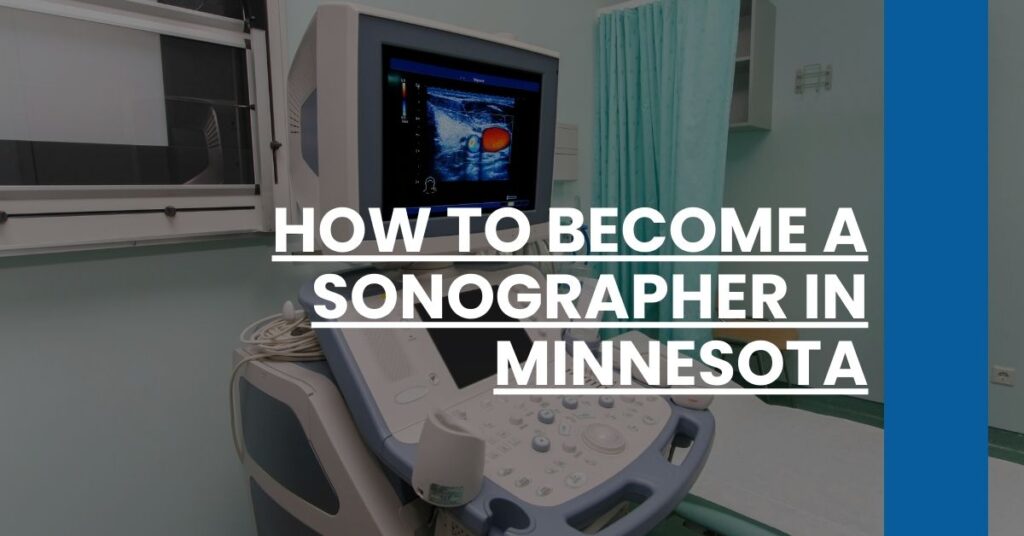Looking for programs in a specific city? Check out our lists of Sonography in Minneapolis, St. Paul, and Rochester.
Becoming a sonographer in Minnesota is a rewarding career path with clear steps to follow.
- Learn about certification: Understand the certification process and exams needed for Minnesota.
- Gain key skills: Access top-notch clinical training and internship opportunities.
- Enhance job prospects: Explore ways to make yourself stand out to Minnesota employers.
With this guide on how to become a sonographer in Minnesota, you’re one step closer to your new career.
Certification and Licensing for Sonographers in Minnesota
If you’re aspiring to become a sonographer in Minnesota, understanding the certification and licensing requirements is crucial. Although Minnesota does not mandate state licensing for sonographers, obtaining professional certification from reputable bodies is essential to advance your career.
Certification Process
To become a certified sonographer, focus on certifications from the American Registry for Diagnostic Medical Sonography (ARDMS). ARDMS certifies sonographers through a series of exams, including:
- Sonography Principles & Instrumentation (SPI): This foundational exam tests your knowledge of ultrasound physics and instrumentation.
- Specialty Certifications: Depending on your career goals, you can take specialty exams in Abdomen, OB/GYN, Breast, Vascular Technology, or other areas.
To sit for these exams, you must complete an accredited education program and gain relevant clinical experience.
Accredited Education Programs
Accredited sonography programs are crucial for acquiring essential knowledge and skills. In Minnesota, several institutions offer these programs:
- St. Cloud Technical & Community College: Offers an associate degree in Diagnostic Medical Sonography.
- Mayo Clinic School of Health Sciences: Provides a comprehensive sonography program covering various specialties.
These programs include classroom instruction and hands-on clinical training, preparing you for ARDMS certification exams.
Clinical Training and Internship Opportunities
Clinical training is integral to sonography education. It allows you to apply classroom knowledge in real-world settings, honing your skills under the guidance of experienced professionals.
Finding Internship Opportunities
Look for sonography programs with robust clinical internship components. Many programs in Minnesota partner with local hospitals and clinics to provide valuable hands-on experience. For instance:
- Mayo Clinic: Offers clinical rotations where students interact with patients and use state-of-the-art ultrasound equipment.
- St. Cloud Technical & Community College: Provides extensive clinical training in various healthcare settings.
Internships and clinical rotations are invaluable for building your professional network and gaining practical experience.
Importance of Certification
Certification from ARDMS or the American Registry of Radiologic Technologists (ARRT) not only validates your skills but also enhances your job prospects. Many employers in Minnesota prefer or require certified sonographers.
Preparing for Certification Exams
To pass certification exams, leverage study guides, practice tests, and review courses. Dedicate time to understand the exam content and format. Joining study groups can also be beneficial.
Key steps to prepare:
- Review course materials: Focus on ultrasound physics, anatomy, and specific specialty areas.
- Practice: Take multiple practice exams to familiarize yourself with the format and timing.
- Stay Updated: Keep abreast of the latest developments in ultrasound technology and techniques.
Completing an accredited program and obtaining certification will significantly boost your credibility and career opportunities as a sonographer in Minnesota.
For more guidance on starting your journey, check out our sonography career services.
Looking for Sonographer Information On States Bordering Minnesota?
In addition to Minnesota, we suggest looking for schools in nearby states.
- How to Become A Sonographer in Wisconsin
- How to Become A Sonographer in Iowa
- How to Become A Sonographer in North Dakota
- How to Become A Sonographer in South Dakota
- How to Become A Sonographer in Michigan
Clinical Training and Internship Opportunities
Clinical training is a cornerstone of sonography education, offering indispensable hands-on experience. Minnesota’s educational programs frequently collaborate with local hospitals, clinics, and healthcare centers to provide clinical internship opportunities. These internships enable students to apply classroom knowledge to real-world situations, mastering imaging techniques, patient interaction, and equipment operation under the supervision of experienced professionals.
Importance of Clinical Training
Participating in clinical training is critical for becoming a proficient sonographer. It allows you to:
- Gain practical experience: Work directly with patients and medical imaging equipment.
- Apply theoretical knowledge: Transition classroom learning to real-world settings.
- Develop professional skills: Improve patient interactions and technical abilities.
How to Find Internship Opportunities
Finding the right internship is crucial for your career in sonography. Here are some steps to help you secure valuable clinical experience:
- Research Accredited Programs: Look for sonography programs with strong clinical training components.
- Network with Healthcare Facilities: Establish connections with hospitals and clinics that offer internships.
- Utilize Career Services: Many educational institutions have career services departments to help you find internships.
For instance, both Mayo Clinic and St. Cloud Technical & Community College provide extensive clinical training as part of their sonography programs.
Typical Experiences During Clinical Practice
During clinical internships, you will engage in various activities, including:
- Performing Ultrasound Examinations: Conduct routine and specialized sonographic procedures.
- Patient Interaction: Communicate effectively with patients to ensure their comfort and understanding.
- Technical Skills Development: Operate and maintain ultrasound equipment efficiently.
- Collaborative Learning: Work alongside experienced sonographers and healthcare providers.
This practical training is designed to build your confidence and prepare you for professional certification and practice.
Benefits of Clinical Internships
Completing a clinical internship offers numerous benefits:
- Enhanced Competency: Regular practice improves your technical skills and knowledge.
- Networking Opportunities: Build relationships with professionals in the healthcare field.
- Job Readiness: Employers value candidates with hands-on experience, making you more competitive in the job market.
Embarking on a clinical internship as part of your sonography education in Minnesota is not only vital for certification but also crucial for your overall professional growth. This hands-on experience is a key component of how to become a successful sonographer in the state.

